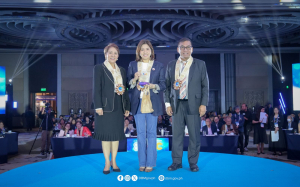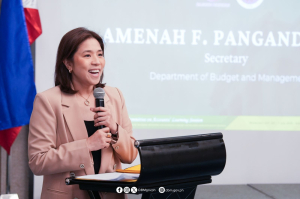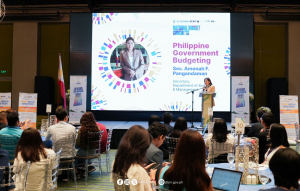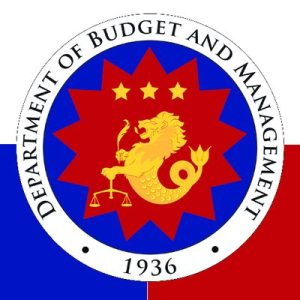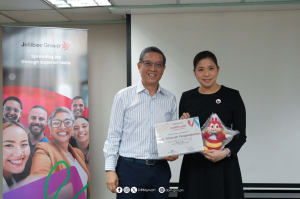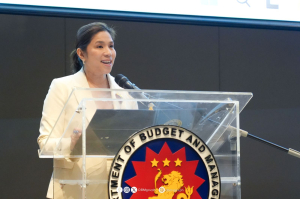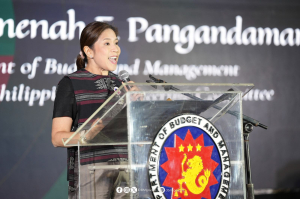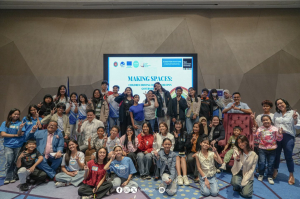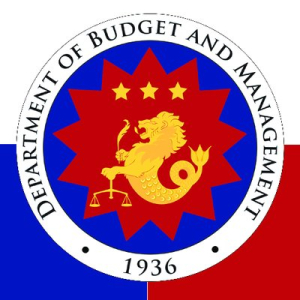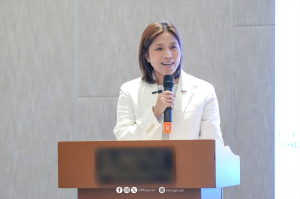
- Details
OGP Asia and the Pacific Regional Meeting (Side Event)
February 5, 2025 | 9:00 AM
Grand Hyatt Manila

To our esteemed host, Makati Business Club (MBC);
Distinguished business leaders and members of the business community;
My colleagues in the National Government;
To all advocates and champions of open government and good governance;
A pleasant morning to all.
Assalamu alaikum wa Raḥmatullahi wa Barakatuh.
First, I thank the MBC, a member of the Philippine Open Government Partnership (PH-OGP) Steering Committee for organizing this event on the sidelines of our OGP Asia and the Pacific Regional Meeting 2025.
By fostering dialogue between the government and the private sector on budget transparency, open governance, and policy reforms, you not only support our cause: you are our partners in our Agenda for Prosperity. Now, more than ever, we understand that true leadership is not defined by the position you hold but by your ability to empower people toward a shared goal of collaboration and good governance.
Fiscal Transparency
As the Chair of the Philippine Open Government Partnership (PH-OGP), the Department of Budget (DBM) has been keen on being an example of transparency and accountability. Our budget documents are uploaded as close to real-time as possible on our website and even laymanized to make this more accessible to the general public.
This is why today, the Philippines is the most fiscally transparent country not just in Southeast Asia but in the entire Asia based on the latest Open Budget Survey (OBS) conducted by the International Budget Partnership—the only independent and fact-based international survey on open budgets—which recognized our timely and comprehensive publication of key budget documents, including pre-budget statement, proposed and enacted budgets, in-year and mid-year reports, and the People’s Budget series.
FY 2025 National Budget
Our commitment also stems from the understanding that having this information is crucial for the business sector as it allows you to identify growth opportunities, mitigate risks, and contribute to national development goals. With this in mind, let me discuss our priorities under the Fiscal Year 2025 National Budget.
The 2025 National Budget amounts to Php 6.326 trillion, equivalent to roughly 22.0 percent of GDP. It is higher by 9.7 percent compared to last year’s budget and will propel economic and social transformation by prioritizing programs and projects aligned with the Philippine Development Plan (PDP) 2023-2028.
The Social Services sector—which includes education, health, and social protection—received the highest budget allocation, with Php 2.030 trillion, or 32.1 percent of the total national budget.
As mandated by the Philippine Constitution, education remains our top priority, with an allocation of Php 1.041 trillion or 16.5 percent of the national budget. The amount is well within the 15 to 20 percent range set by the UNESCO 2030 Education Framework for Action for education expenditures. We will also promote quality healthcare with some Php 274.4 billion and strengthen social protection with Php 283.7 billion.
Infrastructure Development
Meanwhile, the Economic Services sector received the second highest allocation, with Php 1.968 trillion, or 31.1 percent of the national budget. This allotment will also fund the Agriculture and Agrarian Reform sector with Php 247.79 billion to support the administration’s vision of making agriculture the primary source of our food security, although the bulk of the budget for the Economic sector will go to Infrastructure development, which also remains our top priority, that is within 5.0 to 6.0 percent of GDP allocated annually for infrastructure spending.
For this year, some Php 1.644 trillion or 5.7 percent of the GDP will support the Build-Better-More Infrastructure Program, which will drive the development of road networks, bridges, railways, and other critical transport systems that will facilitate connectivity and economic activity across the country.
We will also build social infrastructure, such as school buildings, hospitals and health centers, water supply, and irrigation systems, to help boost inclusive economic growth.
Over the medium term, we will build 186 infrastructure flagship projects (IFPs) with estimated high returns on investments and sizable socioeconomic impact.
Public-Private Partnerships
To fund these critical infrastructure projects, we are leveraging innovative financing mechanisms, including strategic co-investments with the private sector through Public-Private Partnerships or PPPs.
And I am happy to share that private sector participation is now made faster and easier with the new PPP Code.
In fact, we have successfully awarded five (5) PPP airport projects in 2024, including the country’s main international airport—the Ninoy Aquino International Airport—and airports in Laguindingan, Dumaguete, Siargao, and Bohol.
Moreover, we are developing the Luzon Economic Corridor—a transformative hub for commerce, industry, and logistics. This will help drive regional development and fuel economic growth.
Climate Change Expenditures
While all these point to a promising and thriving economy, we also recognize the importance of taking the green path toward a future-proof and sustainable economy.
Hence, our climate change expenditures for FY 2025 will more than double to Php 1.156 trillion from Php 457.4 billion in 2024, the highest increase since we started tracking our climate expenditures since 2015. Among our top priorities will be investing in sustainable energy and climate-smart industries and services, which will substantially increase by over 2,000 percent as we build the foundations of a sustainable economy.
Digital Transformation
To position the Philippines as a prime investment destination, we are developing not just public infrastructure but also digital infrastructure. Hence, we have allocated Php 68.9 billion to support the government’s digital transformation.
As reflected in the highest allocations of our national budget, we remain steadfast in our commitment to developing and protecting the capabilities of individuals and families, transforming production sectors to generate more quality jobs and produce competitive products, and fostering an enabling environment for inclusive growth.
New Government Procurement Act
To truly achieve our Agenda for Prosperity, the government introduced game-changing reforms, including the New Government Procurement Act (NGPA).
As we all know, public procurement is one of the governance aspects most prone to corruption, not just in the Philippines but across the globe. So, even before joining the Department of Budget and Management (DBM), I knew how important it was to update our 20-year-old Government Procurement Reform Act. A World Bank report even states that better procurement strategies and policies could save 26 to 29 percent of a government’s total procurement spending.
I am honored to share that the NGPA signed by President Ferdinand R. Marcos Jr. in July 2024 is now hailed as the biggest anti-corruption measure in the country’s recent history. And I am happy to share that the Implementing Rules and Regulations (IRR) of the NGPA have already been approved just yesterday!
Through the NGPA, we have launched an electronic Marketplace—an online platform where agencies may directly procure supplies and equipment from competent and reputable suppliers.
In the true spirit of Open Government, we have likewise introduced open contracting; hence, data and documents will be disclosed at all stages of procurement, from planning to contract implementation.
Not only that, we will also introduce a participatory procurement process where the public can serve as observers during procurement proceedings.
We will also level the playing field by providing equal opportunities to our MSMEs, especially social enterprises and women-led businesses, to participate in procurement activities.
Open Governance
The business sector has always been a vital part of Open Government and is an indispensable partner in advancing transparent, accountable, and participatory governance worldwide. In the Philippines, MBC is actively building private sector support for the passage of the Freedom of Information (FOI) Law and local FOI ordinances.
These are precisely what we need to expedite the passage and implementation of our reforms. After all, the public and private sectors may operate in different ways, but we share the same goal: to create more and better jobs, accelerate economic growth, and improve the lives of Filipinos.
So, let me share with you the Government's accomplishments and initiatives rooted in the principles of Open Government Partnership (OGP).
First, I am proud to share that for the first time, under the PBBM Administration, we have institutionalized the PH-OGP through Executive Order No. 31, s. 2023. This means that the Open Government values of transparency, accountability, citizen participation, and digitalization are now embedded in government programs and policies.
As I mentioned earlier, we are now the most fiscally transparent country in the whole of Asia. In line with this, the DBM has been recognized by the Presidential Communications Office as a Champion of Information Integrity for our efforts to combat misinformation, disinformation, and fake news through our proactive publication on various platforms.
We are also strengthening public participation in the budget process, ensuring that citizens have a meaningful role in shaping policies and driving the nation’s progress. In October 2023, we launched the OGPinas! Nationwide Advocacy Campaign, in collaboration with the Department of the Interior and Local Government (DILG) and the Philippine Information Agency (PIA). To date, we have already engaged more than 4,000 Filipinos nationwide, involving them in our open government initiatives.
We are also giving life to OGP through participatory budgeting. In February, we launched the Support and Assistance Fund to Participatory Budgeting in collaboration with the DILG. Through this, 75 municipalities will have access to safely managed and resilient water supply and sanitation services and climate-smart evacuation centers. And what is so special about this program is that the municipalities will be identified with the help of Civil Society Organizations, reflecting our commitment to remaining the number one country in Southeast Asia in terms of public participation.
Through these reforms, we have been globally recognized as a leader in open governance, which has allowed us a seat in the OGP Global Steering Committee and given us an opportunity to host this Asia and the Pacific Regional Meeting, which we hope will be the most dynamic, fruitful, insightful, and memorable OGP Regional Summit!
Closing
But as we all know, our journey in advancing good and open governance can only continue to succeed through a collaborative, whole-of-society approach.
So let us work together to foster a Bagong Pilipinas that is open to collaboration, where the private sector plays a pivotal role in providing quality jobs, improving our economy, and achieving our Agenda for Prosperity. May our dialogue today pave the way for a more transparent, accountable, and inclusive government that we all aspire for.
Thank you again to MBC. Mabuhay ang OGP!
Wabillahi Tawfiq Wal Hidaya, Wasalamu alaikum wa rahmatullahi wa Barakatuhu.
END

- Details
OGP Asia and the Pacific Regional Meeting (Side Event)
February 5, 2025 | 1:00 PM

Grand Hyatt Manila
To the Stratbase ADR Institute, headed by Professor Victor Andres Manhit;
Members of Democracy Watch Philippines;
Distinguished leaders from the government, civil society, business community, and the academe;
And to all advocates and champions of open government and good governance;
Assalamu alaikum wa Raḥmatullahi wa Barakatuh.
Good afternoon, everyone. Magandang hapon po.
I am honored to speak at this forum on the sidelines of the Open Government Partnership (OGP) Asia and the Pacific Regional Meeting as it reinforces the very reason we are gathered here: to explore ways to address the region's most critical issues. And today, we choose to face corruption head-on.
According to 1Transparency International’s 2023 Corruption Perceptions Index (CPI), corruption thrives worldwide. In fact, over 80 percent of the world’s population lives in countries with CPI scores below the global average of 43 out of 100, on a scale where 0 indicates the highest level of corruption.
For our citizens, corruption means slower public service delivery, higher prices of commodities, and poorer living conditions for individuals and families. These adversities erode their trust in the government, weakening our democracy and hampering the growth of our economy.
As champions of democratic and open governance, we have a responsibility to step up and lead global efforts to combat corruption as we know that this requires strong leadership and collective resolve.
The theme of this forum, “Leveraging Strategic Collaborations to Address Corruption,” underscores the significance of the OGP Regional Meeting because while we recognize that fighting such a pervasive global issue is never easy, we also understand that genuine collaboration makes meaningful progress possible and worthwhile.
It is evident in the initiatives across Asia and the Asia-Pacific Region, where innovative approaches and collective action have advanced the fight against corruption.
Let’s look at New Zealand, recognized as the third least corrupt country worldwide and first in the Asia-Pacific. They have been championing open contracting through their 2Government Electronic Tenders Service (GETS), a free web-based service that publishes data on government-awarded contracts. This reform on procurement open data promotes fair competition and encourages public monitoring.
Another milestone in our region is 3Indonesia’s beneficial ownership database, launched in 2019 following a legislation that requires all types of corporations to disclose beneficial ownership data. This reform ultimately prevents corruption and ensures accountability for legal violations of those involved in procurement.
Similarly, 4Armenia has been working to ensure greater business transparency and accountability through a series of beneficial ownership and transparency reforms. In 2020, the country published its first beneficial ownership declarations for companies operating in the extractive industries. Three years later, it expanded its ownership disclosure requirements to cover the entire economy.
Meanwhile, 5Mongolia is strengthening participation and accountability in public procurement by launching a portal that regularly publishes information on tender invitations, lists of bidders, contract winners, and contract delivery. Giving citizens access to these data ensures their involvement in procurement processes.
These are just some of the reforms that highlight our region's commitment to open governance.
In the Philippines, I am proud to share that the Department of Budget and Management (DBM) is implementing game-changing initiatives to combat corruption.
In July 2024, President Ferdinand R. Marcos Jr. signed the New Government Procurement Act (NGPA), ushering in a new era of corruption-free procurement in the Philippines.
Hailed as the biggest anti-corruption measure in the country’s recent history, this landmark legislation introduces open contracting, which enables the disclosure of data and documents at all stages of procurement, from planning to contract implementation. Through this, we are indeed at par with global best practices since open contracting is recommended by international bodies such as the European Commission, the World Bank, and even the United Nations.
We also demonstrate our commitment to fostering transparency by requiring the disclosure of the beneficial ownership information of suppliers, manufacturers, distributors, contractors, or consultants to participate in government procurement.
This information will be accessible to the public through an online registry maintained by our Government Procurement Policy Board (GPPB), ultimately preventing and mitigating the risk of conflicts of interest and corruption.
The NGPA also recognizes the role of Civil Society Organizations (CSOs) in enhancing transparency and public monitoring in government procurement. Hence, observers from the Commission on Audit (COA) and at least two from civil society will be invited to participate in all levels of the procurement process.
And just yesterday, February 4, at exactly 4 PM, we witnessed the approval of the Implementing Rules and Regulations (IRR) of the NGPA! This is the fastest crafting of an IRR which usually takes years, but this time, it took only six months—a testament to our commitment to a transparent, accountable, and participatory governance.
Our Public Financial Management (PFM) Reforms Roadmap 2024-2028, launched in October 2024, also leverages digitalization to mainstream our government processes and strengthen our PFM systems.
This will expedite the adoption of our Integrated Financial Management Information System (IFMIS) across all government agencies to ensure seamless and efficient government transactions.
One of its cornerstones is the Budget and Treasury Management System (BTMS), which we just launched last December! It is a unified financial management platform that connects existing separate systems to facilitate real-time online accounting, monitoring, and oversight of obligations and disbursements. With this transparency component, we ensure that every peso from our national budget is accounted for and properly spent for the benefit of our citizens.
We are also reviving the Digital Information for Monitoring and Evaluation (Project DIME), which enables a more open monitoring and evaluation of big-ticket infrastructure projects.
It utilizes existing technologies such as satellites, drones, and geotagging to compare fund utilization with actual project completion status, eliminating the so-called “ghost projects.” And so at the core of this initiative is our commitment to ensuring that the substantial portion of our national budget allotted annually for infrastructure projects delivers equally substantial results for our people.
We are energized to advance these reforms because we know that we are not alone. As the Chairperson of the Philippine Open Government Partnership (PH-OGP), I am also proud to share some of the results of the commitments under our 6th PH-OGP National Action Plan, specifically those driven by various government and civil society members to strengthen our democracy.
The Presidential Communications Office has achieved a substantial level of completion in its commitment to localizing the Freedom of Information (FOI) Program, marked by the launch of the Local FOI Ordinance Handbook. This will be a reference for our Local Government Units (LGUs) in drafting and implementing their FOI ordinances.
Our Commission on Elections, on the other hand, has completed its commitment to conducting more overseas and local field registration activities for overseas voters. By doing so, we ensure that all Filipinos worldwide can exercise their right to vote and contribute to our nation’s development.
The Department of the Interior and Local Government (DILG) has also made significant progress in empowering and engaging CSOs across the Philippines. From increasing the number of CSO members in Local Development Councils to building their capacity in implementing local development plans, the DILG has notably scaled up civil society involvement in local governance.
We also have two panel discussions for this side event, covering transparency and accountability in government transactions, as well as the upcoming 2025 elections and fighting corruption in a democratic society.
I hope these discussions will help us see that we have come a long way in our quest to eradicate corruption through a comprehensive, whole-of-open-government approach. But of course, we acknowledge that there is still much to be done to fully achieve our goals.
As we move forward, let us remember that the success of our reforms is built on the foundation of strategic collaboration among the government, private sector, academe, and civil society.
So, let us continue working together to build a corruption-free, future-ready Bagong Pilipinas in the Asia Pacific—a region where every citizen trusts the government and actively contributes to its progress and development.
Thank you very much.
Wabillahi Tawfiq Wal Hidaya, Wasalamu alaikum wa rahmatullahi wa Barakatuhu.
END
References:
1Transparency International Corruption Perceptions Index
2Open Government Partnership - New Zealand Commitments
3Indonesia - Beneficial Ownership Reform
4Armenia - Beneficial Ownership
5Open Government Partnership - Mongolia Commitments
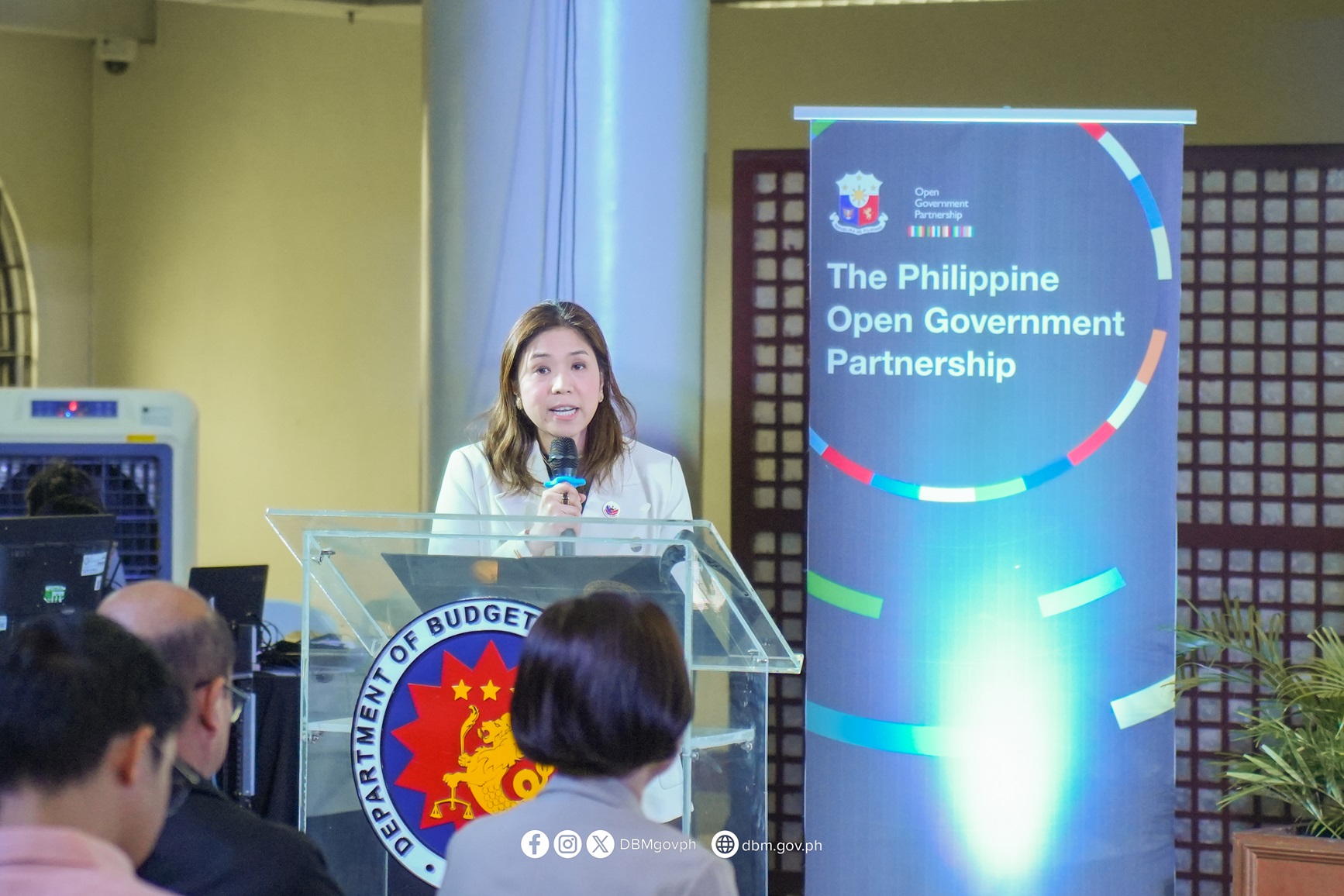
- Details
DBM Boncodin Hall

A pleasant afternoon to my fellow Philippine Open Government Partnership (PH-OGP) Steering Committee members and all the advocates and champions of open government and good governance.
Magandang hapon po sa ating lahat.
Assalamu alaikum wa Raḥmatullahi wa Barakatuh.
As Budget and Management Secretary and PH-OGP Chairperson, I am thrilled to present our 2024 Annual Accomplishment Report, which highlights key milestones, as well as our collective efforts to push the Open Government agenda and which has allowed our country to position itself as a global leader in the open governance space.
The landmark institutionalization of the PH-OGP through the signing of Executive Order No. 31 in 2023 by no less than our President Ferdinand R. Marcos Jr. has made our Open Government agenda more vibrant than ever. It led to the formation of an even stronger Steering Committee—our policy- and decision-making body—which now includes representatives from women, youth, environment and climate, and justice sectors.
In the same year, we produced our 6th PH-OGP National Action Plan (NAP), the very first of its kind with a four-year implementation period.
And in May, we made history by engaging the Diplomatic partners during the celebration of Open Government Week 2024, which was filled with multi-partner-led sessions focused on different Open Government themes.
Building on the momentum of OpenGov Week 2024, we have implemented several targeted initiatives to address key Open Government challenge areas.
Access to Information
As the Department responsible for ensuring the efficient and sound utilization of our nation’s budget, DBM ensures that budget documents are accessible and open to public scrutiny. Our consistency in publishing the pre-budget statement, proposed and enacted budget, in-year and mid-year reports, and the People’s Budget series have gained us global recognition as the top country in Asia for budget transparency and sixth in the world for budget oversight based on the latest Open Budget Survey. So, our goal is to make it number one in the world.
Anti-Corruption
Driven by our commitment to modernizing procurement and meeting the people’s needs, we successfully pushed for the enactment of the New Government Procurement Act, hailed as the country’s biggest anti-corruption measure in recent history.
Signed into law by PBBM in July 2024, the NGPA mitigates the risk of conflicts of interest and introduces open contracting—a global standard enabling the public to access data and documents at all stages of procurement. It also encourages public participation of our civil society members so they can help ensure the prudent and judicious use of government resources.
Public Participation
We are also proud to share the resounding success of our journey toward empowering local communities and bringing the government closer to the people.
In collaboration with the Department of the Interior and Local Government, we launched the Support and Assistance Fund to Participatory Budgeting. This strengthened the partnership between CSOs and the government to deliver universal and equitable access to safe drinking water and sanitation services to identified municipalities.
We also take pride in the four local government units (LGUs) that became members of the prestigious OGP Local Program in April after passing a stringent selection process. These are Quezon City, Baguio City, the Municipality of Larena in Siquijor, and Tagbilaran City. They joined South Cotabato, which was accepted to the program in 2018.
Our OGPinas! Nationwide Advocacy Campaign has also evolved into a platform for raising awareness about the progress of the commitments under the 6th PH-OGP National Action Plan (NAP).
In just a year, we have visited nine regions, engaging almost 4,000 stakeholders, including OGP champions in the Bangsamoro Autonomous Region in Muslim Mindanao (BARMM).
And in the Legazpi leg of OGPinas!, we also celebrated International Women’s Day with the civil society in the Bicol Region. At this event, we were proud to showcase the PH-OGP as a shining example of women taking the lead in the country’s governance—with yours truly as Chair for Government and Ms. Araw Chavez as Chair for the Non-Government sector.
Digital Governance
Towards digitalizing our bureaucracy, we launched our Budget and Treasury Management System (BTMS), the cornerstone of our Integrated Financial Management Information System (IFMIS), last December.
This tool provides accurate, real-time data to support better decision-making, and it is a significant part of our Public Financial Management (PFM) Reforms Roadmap 2024-2028, our blueprint for modernizing and harmonizing our PFM processes, which we also launched last year.
OGP Leaders Roundtable
The Philippines has had opportunities to bring forward our advocacies to the global stage.
Last September, we joined the OGP Leaders Roundtable on the sidelines of the 79th United Nations General Assembly, proving our determination to share our best practices with all our fellow OGP champions on how we mainstreamed Open Government into our socioeconomic framework.
Not long after, on October 1, the Philippines, represented by yours truly, started its term as a member of the OGP Global Steering Committee, giving us a unique opportunity to develop, promote, and safeguard the Partnership’s values.
To kickstart our initiatives for the new year, we are thrilled to announce that the much-anticipated OGP Asia and the Pacific Regional Meeting is just a few days away!
Just last Sunday, we held the first-ever OGP Fun Run to officially mark the beginning of our Regional Meeting, and I am proud to share that over 4,000 participants ran for transparency, accountability, and participatory governance with us! We would like to thank all who came to support this run for open governance. This is living proof of our commitment to applying a whole-of-government and whole-of-society approach to OGP!
We likewise present to you our OGP Legacy Book entitled “Partners for Prosperity,” to be presented to us by Undersecretary Margaux Salcedo and the inspirational gallery to be unveiled by Undersecretary Rolando Toledo.
And now, allow me to present this video showcasing the official logo of the 2025 OGP Asia and the Pacific Regional Meeting, symbolizing our transformative journey towards open governance—driven by the passion and purpose of committed OGP champions in our community of nations.
Maraming salamat po. Thank you very much. Wabillahi Tawfiq Wal Hidaya, Wasalamu alaikum wa rahmatullahi wa Barakatuhu.
END

- Details
To my dearest colleagues and fellow public servants from the Department of Budget and Management (DBM), isang mapagpalang araw po sa ating lahat.
Assalamu alaikum wa Rahmatullahi wa Barakatuh.
Bagong taon na naman, ibig sabihin, bagong buhay, pero sa DBM pareho pa rin: Dito Bawal Matulog, Dito Bawal Mapagod, pero Dito Babae Maganda.
We have a lot of work ahead of us this 2025...dahil wala tayong blank space—Alhamdullilah, ang mayroon tayo ay fiscal space, limited nga lang.
But we are grateful that we have a budget for FY 2025 because a reenacted budget would only mean delays in our priority programs and projects and setbacks in our economic growth targets, including “our goals of achieving single-digit poverty levels and upper-middle-income status.”
Kaya magpasalamat po tayo sa ating Pangulo na hindi reenacted ang ating budget!
Now with our limited fiscal space, how do we stay on track with our Agenda for Prosperity?
First, it is incumbent upon us to ensure better and strategic planning, and improve even further our budget preparation and execution process, especially to address the perennial challenge of underspending and achieve our targets in spite of various headwinds.
Second, as always, we will consider how agencies utilized their previous year’s budget and the implementation progress of their mandated programs and projects. The end goal is to make sure that only implementation-ready projects and proposals are considered, securing not only the equitable allocation but also the proper utilization of public funds.
Budget proposals should contain concrete programs, plans, and designs that outline key procurement and implementation milestones.
Third, now that we have the New Government Procurement Act (NGPA) (Republic Act No. 12009) and the e-marketplace which were designed to make procurement easier and more efficient, these should vastly improve our budget utilization.
I am also very proud that the NGPA has been hailed as the biggest anti-corruption measure in the country’s recent history as it introduces key reforms to enhance transparency and accountability while modernizing our Philippine Government Electronic Procurement System (PhilGEPS). It introduces the Most Economically Advantageous Responsive Bid or MEARB; institutionalizes the conduct of Early Procurement Activities; espouses open contracting; opens the procurement process to the participation of civil society organizations in procurement proceedings; and requires disclosure of beneficial ownership information. On top of this, it also champions green public procurement.
As we improve our budget execution, let us also follow our various roadmaps.
First, let us ensure the continuous alignment of our priorities and policy directions included in the Philippine Development Plan 2023-2028.
We now also have a Public Financial Management (PFM) Reforms Roadmap 2024-2028, which we turned over to the President last year. This is a comprehensive blueprint for the full digitalization of PFM processes and the adoption of the Integrated Financial Management Information System (IFMIS) across all government agencies. And I am happy to share that last December, we already successfully launched the Budget and Treasury Management System (BTMS) to facilitate real-time online accounting, monitoring, and oversight of obligations and disbursements.
In line with this, we will also continue our Public Financial Management Competency Program (PFMCP).
Finally, let us strengthen our commitment to the Open Government Partnership. Today, the Philippines is the No. 1 Most Fiscally Transparent country not just in Southeast Asia but in the entire Asia. This is based on the recently published 2023 Open Budget Survey (OBS). The DBM was also recognized as a Champion of Information Integrity by the Presidential Communications Office. Let us continue to be beacons of integrity, especially because last October, represented by yours truly, the Philippines became a member of the OGP Global Steering Committee. So we are now at the forefront of pushing forward the values of transparency, accountability, and inclusivity not just in the Philippines but to our community of nations around the world. In fact, we will host the OGP Asia and the Pacific Regional Meeting this coming February 5 to 7.
But today, please listen well to our resource persons from our Fiscal Planning and Reforms Bureau, as well as our Budget and Management Bureaus, who will discuss the budget preparation at a glance, budget proposals for inclusion in the agency budget, the Budget Preparation Forms and Instructions, as well as the Submission Requirements and Budget Preparation Calendar. The Philippine Commission on Women is also joining us for the first time to facilitate a planning session on Gender and Development (GAD) so we can further strengthen the “Women’s Budget.”
Mabuhay po tayong lahat! Mabuhay po ang Bagong Pilipinas!
Wabillahi Tawfiq Wal Hidaya, Wasalamu alaikum wa rahmatullahi wa Barakatuhu.
END

- Details

A pleasant afternoon to everyone.
Assalamu alaikum wa Raḥmatullahi wa Barakatuh.
First, I would like to thank our esteemed resource speaker, our very own former DBM Secretary Benjamin Diokno, who now serves as a member of the Bangko Sentral ng Pilipinas (BSP) Monetary Board, for accepting our invitation to talk about his recently published book.
Congratulations, and welcome back to your home of many years, Sec. Ben!
We are so grateful to have you today as your extensive and exemplary service always inspires resilience, adaptability, and hope in the face of unprecedented challenges.
As his Assistant Governor at the Bangko Sentral ng Pilipinas, I personally witnessed how Gov Ben led the BSP out of the pandemic. I don't think it's an understatement to say that he saved the Philippine economy during the pandemic. It is no wonder that he was named the Global and Asia-Pacific Central Banker of the Year by The Banker in 2022.
If you want to learn how Gov Ben did it, aside from his latest book, the tribute of The Banker details how he expertly guided the BSP to fulfill its core functions, drive significant policy initiatives, and support the National Government during one of the most challenging periods in history—the COVID-19 pandemic.
He introduced reforms that mitigated the adverse impact of the pandemic on our economy and paved the way for its early recovery. This includes accelerating digitalization, promoting financial inclusion, strengthening BSP’s internal operations and research capabilities, enhancing consumer protection, and, most importantly, fostering a stakeholder-centric approach that has moved the institution closer to the Filipino people.
Gov. Ben was also instrumental in the modernization of the country’s banking system and invigorating the financial sector. He ensured that Philippine banks were well-capitalized and robust through the BSP’s regulatory and legislative measures.
From this, we can learn that when asked to close our doors due to danger, we must look for windows of opportunity to adapt and thrive amidst extraordinary circumstances.
So at this time, when the economy has been significantly impacted by the recent typhoons and severe weather conditions, discussing this book could not have been timelier. This masterpiece is not only the personal account of an incomparable leader but also an important guide for future leaders in times of crisis.
Once again, thank you for gracing us with your presence, sir, especially during library month. Your book will certainly be another great addition to our library.
So, as we celebrate National Library and Information Services Month, let us make the most of this golden opportunity to harness the potential of libraries to empower communities, foster inclusivity, and build resilience amidst adversities—not just this November but throughout our lives.
Let us all listen intently to a great leader, educator, one of my mentors, and author whose insights will surely leave an indelible mark in our hearts.
And finally, let this book serve as a reminder to engage more with our libraries and find books that will meaningfully impact our present lives and our nation’s future.
Thank you very much.
Wabillahi Tawfiq Wal Hidaya, Wasalamu alaikum wa rahmatullahi wa Barakatuhu.
END
